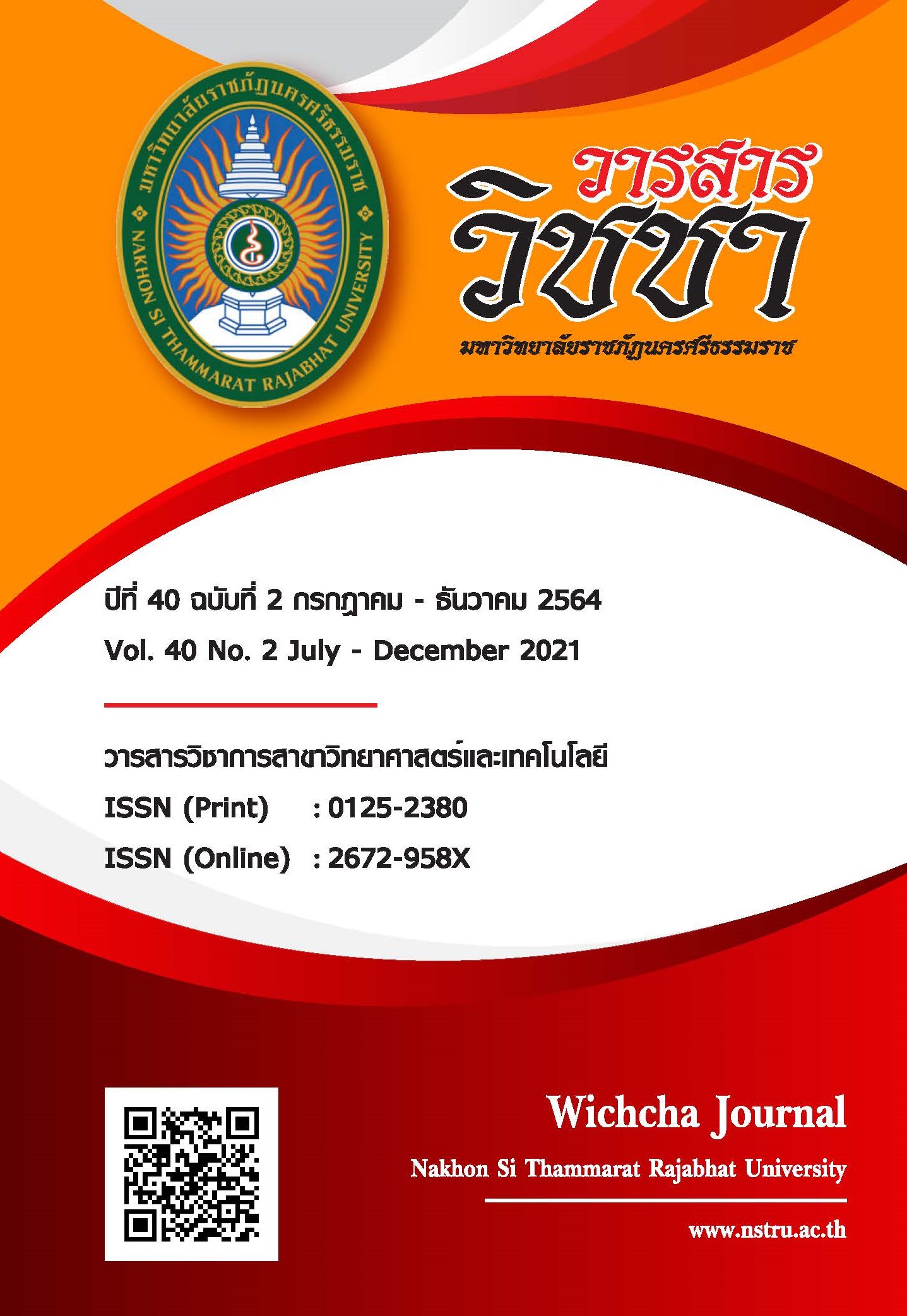Performance Analysis System for Volleyball: Efficacy of Scoring Performance ระบบการวิเคราะห์สมรรถนะในกีฬาวอลเลย์บอล: ประสิทธิภาพสมรรถนะการทำแต้ม
Main Article Content
Abstract
This research aimed to study and compare the efficacy of scoring performance, losing points, playing successively between winning sets and losing sets. The subjects were 15 volleyball matches played in The 47th Thai University Games, or The Sun Games 2020, during January 10th-19th, 2020. Data were collected with a performance analysis program for 15 matches, 88 sets, 14,332 data from the second round to the final. Perform performance analysis and study scoring efficiency, losing points, and continuous play using the mean, standard deviation, percentage, and t-value analysis statistics. Comparison of each set between the winning sets and the losing sets. The results showed that scoring (winning sets 17.35±4.04 times, losing sets 13.81±3.75 times) and losing points (winning sets 9.93±8.20 times, losing sets 8.70±5.96 times. times), there was a difference at a statistically significant level of .05. But free points (winning sets 7.35±4.40 times, losing sets 7.64±4.43 times), advantage (winning sets 51.96±15.34 times, losing sets 49.48±16.81 times), counterattack (winning sets 42.00±9.87 times, losing sets 42.45±13.50 times), disadvantage (winning sets 13.38±6.86 times, losing sets 14.51±6.52 times) and minus points (winning sets 22.25) ±6.75 times, 24.80±6.74 losing sets), there were no statistical difference. As for the performance efficacy, it was found that there was a difference between the performance efficacy (winning sets -0.0387±-0.08876, losing sets -0.735±0.05936) and scoring efficiency (winning sets -0.1019±0.23638, losing sets -0.2084±0.16751) at a statistical significance of 0.05. However, counterattack efficacy (winning sets 0.3574±0.3229, losing sets 0.09441±0.11166) was not statistically different. Therefore, the team must maintain the ability to pass the ball to allow teams to have the opportunity to showcase their scoring potential and reduce their own scoring mistakes.
Article Details
เนื้อหาและข้อมูลในบทความที่ลงตีพิมพ์ในวารสารวิชชา มหาวิทยาลัยราชภัฏนครศรีธรรมราช ถือเป็นข้อคิดเห็นและความรับผิดชอบของผู้เขียนบทความโดยตรง ซึ่งกองบรรณาธิการวารสารไม่จำเป็นต้องเห็นด้วยหรือร่วมรับผิดชอบใด ๆ
บทความ ข้อมูล เนื้อหา รูปภาพ ฯลฯ ที่ได้รับการตีพิมพ์ในวารสารวิชชา มหาวิทยาลัยราชภัฏนครศรีธรรมราช ถือเป็นลิขสิทธ์ของวารสารวิชชา มหาวิทยาลัยราชภัฏนครศรีธรรมราช หากบุคคลหรือหน่วยงานใดต้องการนำข้อมูลทั้งหมดหรือส่วนหนึ่งส่วนใดไปเผยแพร่ต่อหรือเพื่อการกระทำการใด ๆ จะต้องได้รับอนุญาตเป็นลายลักษณ์อักษรจากวารสารวิชชา มหาวิทยาลัยราชภัฏนครศรีธรรมราชก่อนเท่านั้น
The content and information in the article published in Wichcha journal Nakhon Si Thammarat Rajabhat University, It is the opinion and responsibility of the author of the article. The editorial journals do not need to agree. Or share any responsibility.
References
Drikos, S., Angelonidis, Y. and Sobonis, G. (2018). The role of skills in winning in different types of set in women’s volleyball. International Journal of Performance Analysis in Sport, 18(6), 950-960.
Fried, G and Mumcu, C. (2017). Sport analytics: A data-driven approach to sport business and management. New York: Routledge.
Hughes, M and Franks, I.M. (2015). Essentials of performance analysis in sport. (2nd ed). New York: Routledge.
Kaewpunya, C., Tangchaisuriya, P., Wangtrakul, P. and Rangubhet, K.R. (2019). The Efficiency of Beach Volleyball Setting in University Games of Thailand 43rd Kran-Krao Games. In National conference of the 11th Science Research (267-273). Bangkok: Srinakharinwirot University.
Mantor, R., Prawonganupharp, P., Valunpion, A. and Rangubhet, K.R. (2018). Performance analysis of win score and lose score in beach volleyball. In National Conference of the 10th Science Research (305-310). Mahasarakham: Mahasarakham University.
Marszałek, J., Gómez, M.A. and Molik, B. (2018). Game performance differences between winning and losing sitting volleyball teams regarding teams’ ability. International Journal of Performance analysis in Sport. 18(2), 367-379.
McMorris, T. (2014) Acquisition and performance of sports skills. New Jersey: Wiley.
Minton, R.B. (2017). Sports math: an introductory course in the mathematics of sports science and sports analytics. Florida: CRC Press, Taylor & Francis Group.
Oldenburg, S. (2015). Complete conditioning for volleyball. Illinois: Human Kinetics.
Peters, D. and O'Donoghue, P. (2014). Performance analysis of Sport IX. New York: Routledge.
Ponlawan, T. and Rangubhet, K.R. (2018). Performance analysis of attack in beach volleyball. In National Conference of the 10th Science Research (54-60). Mahasarakham: Mahasarakham University.
Rangubhet, K.R. (2014). Development of performance analysis system for male beach volleyball players. D.Sc. thesis in Dissertation of Sports Science. Chulalongkorn University, Bangkok.
Rangubhet, K.R. (2019). Innovation of performance analysis for beach volleyball: performance indicator in male beach volleyball athletes. In National Conference of the 11th Science Research (242-251). Bangkok: Srinakharinwirot University.
Rattanasirivivattana, R., Chailert, P., Jantaraj, N. and Rangubhet, K.R. (2019). Performance analysis of beach volleyball serving in university games of Thailand 43rd Kran-Krao games. In National Conference of the 11th Science Research (274-280). Bangkok: Srinakharinwirot University.
Reeser, J.C. and Bahr, R. (2017). Volleyball. New Jersey: John Wiley & Sons.
Reynaud, C. (2015). The volleyball coaching bible/American volleyball coaches administration. Illinois: Human Kinetics.
Santi, K., Hermsarnjod, J. and Rangubhet, K.R. (2021). Performance analysis of offensive position in women’s volleyball in the SEA games 2019 competition. In National Conference of the 10th Phayao Research (445-451). Phayao: Phayao University.
Yu, Y., Garcia-De-Alcaraz, A., Wang, L. and Liu, T. (2018). Analysis of winning determinant performance indicators according to teams level in Chinese women’s volleyball. International Journal of Performance analysis in Sport. 18(5), 750-763.


